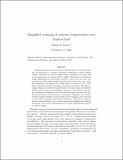Files in this item
Amplified warming of extreme temperatures over tropical land
Item metadata
| dc.contributor.author | Byrne, Michael P. | |
| dc.date.accessioned | 2022-11-15T13:30:02Z | |
| dc.date.available | 2022-11-15T13:30:02Z | |
| dc.date.issued | 2021-11 | |
| dc.identifier | 276383119 | |
| dc.identifier | 5f97c04f-fb6d-47cb-b2d8-9b800acdda16 | |
| dc.identifier | 85117439871 | |
| dc.identifier | 000709743900001 | |
| dc.identifier.citation | Byrne , M P 2021 , ' Amplified warming of extreme temperatures over tropical land ' , Nature Geoscience , vol. 14 , pp. 837-841 . https://doi.org/10.1038/s41561-021-00828-8 | en |
| dc.identifier.issn | 1752-0908 | |
| dc.identifier.other | RIS: urn:EBD6D11BDCF191AB88B80193B39DC6B4 | |
| dc.identifier.other | RIS: Byrne2021 | |
| dc.identifier.other | ORCID: /0000-0001-9019-3915/work/101958988 | |
| dc.identifier.uri | https://hdl.handle.net/10023/26398 | |
| dc.description | Support from the European Union’s Horizon 2020 research and innovation programme under the Marie Skłodowska-Curie grant agreement no. 794063. | en |
| dc.description.abstract | Extreme temperatures have warmed substantially over recent decades and are projected to continue warming in response to future climate change. Warming of extreme temperatures is amplified over land, with severe implications for human health, wildfire risk and food production. Using simulations from 18 climate models, I show that hot days over tropical land warm substantially more than the average day. For example, warming of the hottest 5% of land days is a factor of 1.21 ± 0.07 larger than the time-mean warming averaged across models. The climate change response of extreme temperatures over tropical land is interpreted using a theory based on atmospheric dynamics. According to the theory, warming is amplified for hot land days because those days are dry, which is termed the ‘drier get hotter’ mechanism. Changes in near-surface relative humidity further increase tropical land warming, with decreases in land relative humidity being particularly important. The theory advances physical understanding of the tropical climate and highlights land surface dryness as a key factor determining how extreme temperatures respond to climate change. | |
| dc.format.extent | 13 | |
| dc.format.extent | 466847 | |
| dc.language.iso | eng | |
| dc.relation.ispartof | Nature Geoscience | en |
| dc.subject | Climate sciences | en |
| dc.subject | Projection and prediction | en |
| dc.subject | Atmospheric dynamics | en |
| dc.subject | Climate change | en |
| dc.subject | GE Environmental Sciences | en |
| dc.subject | 3rd-DAS | en |
| dc.subject | SDG 2 - Zero Hunger | en |
| dc.subject | SDG 3 - Good Health and Well-being | en |
| dc.subject | SDG 13 - Climate Action | en |
| dc.subject | AC | en |
| dc.subject.lcc | GE | en |
| dc.title | Amplified warming of extreme temperatures over tropical land | en |
| dc.type | Journal article | en |
| dc.contributor.institution | University of St Andrews. School of Earth & Environmental Sciences | en |
| dc.identifier.doi | 10.1038/s41561-021-00828-8 | |
| dc.description.status | Peer reviewed | en |
| dc.date.embargoedUntil | 2022-03-21 | |
| dc.identifier.url | https://www.essoar.org/doi/10.1002/essoar.10505497.1 | en |
This item appears in the following Collection(s)
Items in the St Andrews Research Repository are protected by copyright, with all rights reserved, unless otherwise indicated.

